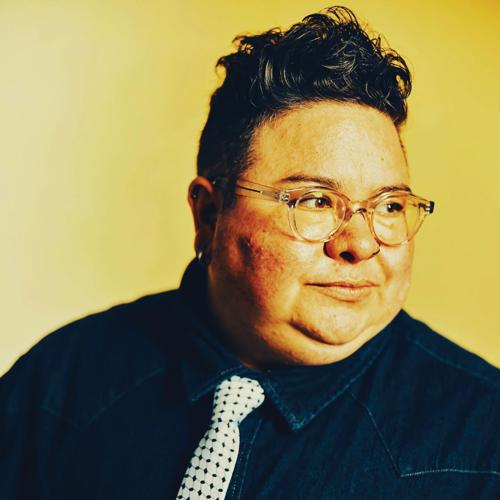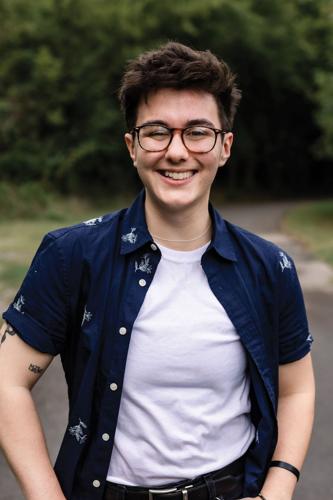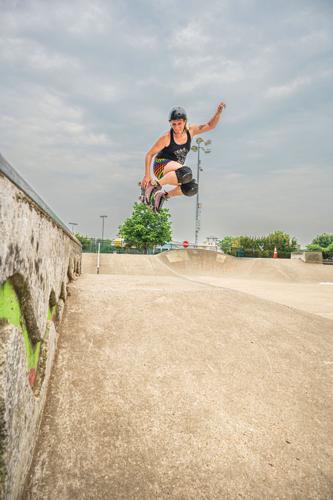After a vocal push from right-wing activists and politicians in Tennessee, a law banning gender-affirming care for minors passed in the state legislature earlier this year. As a result, the Pediatric Transgender Clinic at Monroe Carell Jr. Children’s Hospital at Vanderbilt University Medical Center recently stopped serving patients.
With the rights and well-being of transgender citizens under attack here in Tennessee and across the nation, the Scene decided to reach out to members of the trans community and hear from them directly on their experiences — not just the bad, but the good and joyful, in their own words. Here’s what we heard from three members of Nashville’s trans community when we reached out to them for our Pride Issue.

Kara Robbins
Kara Robbins
“I’ve found a really good friend group. We’re all queer parents around the same age, and we all let our kids run around and we just hang out. We get together two or three times a week. Every Monday night we have family dinner and we rotate whose house it’s at. Every Thursday night we meet at a local pavilion and skate.
“I guess it’s just freeing. Strap some wheels to your feet and you can fly. Pre-transition I actually used to ride BMX. I lost all my upper body strength, but I found out that my leg strength was still there. I started roller-skating when I was 7, but I used to just do the rink. I found YouTube videos of people skating skate parks on old-school roller skates and I was like, ‘Yep, that’s what I’m doing.’
“One thing that I really like about skating is that it forces you to get out of your head. If you’re not paying attention to what you’re doing, you’re going to crash and you’re going to bleed. It’s very in-the-moment.
“There’s just a lot of anxiety around existing, and it gets very tiring. I try to just hang out in my happy little bubble with my happy people.” As told to HANNAH HERNER

Roberto Che Espinoza
Roberto Che Espinoza
When the Scene reached out to local theologian and ethicist Dr. Roberto Che Espinoza to talk about trans joy, he agreed. But when we meet up a few weeks later, Espinoza is having trouble accessing that joy. But that led to an important conversation about the duality of joy and hardship.
“I don’t think you have joy without the struggle, you don’t have joy without reality,” says Espinoza. “And what is real for trans people right now is a lot of fear of the criminalization of being trans, and the economic burden.”
Espinoza teaches at Duke University, writes a Substack and has authored two books — Body Becoming: A Path to Our Liberation and Activist Theology — among many other accomplishments. He tells the Scene that helping others describe their feelings fosters joy.
“For me the joy is helping people feel, and knowing that maybe I’m planting seeds for someone to stay alive. But I have to do that myself, too. … A lot of us are struggling with the impetus to remain alive in the face of such political devastation.”
On difficult days, Espinoza seeks joy where he can — taking siestas, drinking tea, adding garlic-scape butter to a mushroom risotto that he’ll serve to friends later.
“There is an existential threat against trans people,” says Espinoza. “And I think we have to hold onto the joy and the pain simultaneously. And remember that hope is knowing that all possibilities aren’t exhausted.” KELSEY BEYELER

Jace Wilder
Jace Wilder
We have a lot to thank Jace Wilder for. As an education manager for the Tennessee Equality Project, Wilder has advocated for trans rights by educating lawmakers, media outlets and classrooms about trans people. Outside of his work, Jace enjoys hiking, painting, decorating his space, making Marvel-inspired jewelry, reading comics, caring for his cat Moon and spending time with his community. Community is crucial.
“[People] don’t get to witness the beauty of the celebration and happiness that occurs with having gender-affirming care, or having your pronouns said for the first time or having your name said for the first time properly,” says Jace. “Those are moments that I wish people would step back and be able to witness.” KELSEY BEYELER
Plus we chat with hometown queen Aura Mayari and delve into the history of Play








